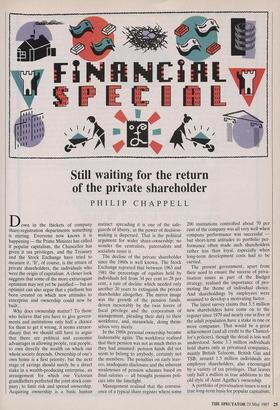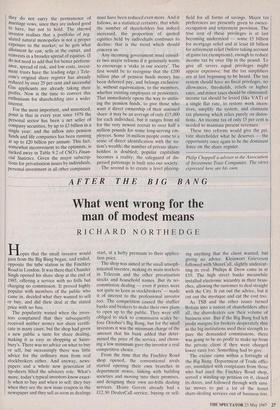Still waiting for the return of the private shareholder
PHILIP CHAPPELL
Why does ownership matter? To those who believe that you have to give govern- ments and institutions only half a chance for them to get it wrong, it seems extraor- dinary that we should still have to argue that there are political and economic advantages in allowing people, real people, to own directly the wealth on which our whole society depends. Ownership of one's own home is a first priority; but the next stage of savings should surely be a direct stake in a wealth-producing enterprise, an arrangement for which our Victorian grandfathers perfected the joint stock com- pany, to limit risk and spread ownership. Acquiring ownership is a basic human
instinct: spreading it is one of the safe- guards of liberty, as the power of decision- making is dispersed. That is the political argument for wider share-ownership; no wonder the centralists, paternalists and socialists resist it.
The decline of the private shareholder since the 1960s is well known. The Stock Exchange reported that between 1963 and 1981 the percentage of equities held by individuals fell from 34 per cent to 28 per cent, a rate of decline which needed only another 20 years to extinguish the private shareholder altogether. The mirror image was the growth of the pension funds, driven inexorably by the twin forces of fiscal privilege and the corporatism of management, pleading their duty to their workforce, and, meanwhile, doing them- selves very nicely.
In the 1980s personal ownership became fashionable again. The workforce realised that their pension was not as much theirs as they had assumed: pension funds did not seem to belong to anybody, certainly not the members. The penalties on early leav- ers; inadequate disclosure and the inherent weaknesses of pension schemes based on final salaries — all brought pensions poli- cies into the limelight.
Management realised that the conveni- ence of a typical share register where some
200 institutions controlled about 70 per cent of the company was all very well when company performance was successful — but short-term attitudes to portfolio per- formance often made such shareholders rather less than loyal, especially when long-term development costs had to be carried.
The present government, apart from their need to ensure the success of priva- tisation issues as part of the Budget strategy, realised the importance of pro- moting the theme of individual choice. And shareholdings by employees were assumed to develop a motivating factor.
The latest survey claims that 5.5 million new shareholders have come on to the register since 1979 and nearly one in five of the adult population have a stake in one or more companies. That would be a great achievement (and all credit to the Chancel- lor's policies), though the detail is less well understood. Some 3.3 million individuals hold shares only in privatised companies, mainly British Telecom, British Gas and TSB: around 1.5 million individuals are employee shareholders, also encouraged by a variety of tax privileges. That leaves only half a million as true additions to the old style of Aunt Agatha's ownership.
A portfolio of privatisation issues is not a true long-term basis for popular capitalism;
they do not carry the permanence of marriage vows, since they are indeed good to have, but not to hold. The shrewd investor realises that a portfolio of reg- ulated natural monopolies is not a proper exposure to the market; so he gets what allotment he can, sells at the outset, and reinvests in a broader spread of equities. (I do not need to add that for better perform- ance, spread of risk, and low costs, invest- ment trusts have the leading edge.) Tele- com's original share register has already reduced by over 25 per cent and successful Gas applicants are already taking their profits. Now is the time to convert this enthusiasm for shareholding into a wider interest.
For the most important, and unnoticed, point is that in every year since 1979 the personal sector has been a net seller of company securities, by up to £3 billion in a single year; and the inflow into pension funds and life companies has been running at up to £20 billion per annum. This fact, somewhat inconvenient to the optimists, is tucked away in Table 9.2 of CSO's Finan- cial Statistics. Given the major subscrip- tions for privatisation issues by individuals, personal investment in all other companies
must have been reduced even more. And it follows, as a statistical certainty, that while the number of shareholders has indeed increased, the proportion of quoted equities held by individuals continues to decline: that is the trend which should concern us.
Any incoming government must consid- er two major reforms if it genuinely wants to encourage a 'stake in our society'. The first would be to recognise that the £200 billion plus of pension funds money has been deferred pay, and belongs exclusive- ly, without equivocation, to the members, whether existing employees or pensioners. That immediately opens the way to unitis- ing the pension funds, to give those who want it direct ownership of their assessed share: it may be an average of only £15,000 for each individual, but it ranges from nil for the very newest recruit to over half a million pounds for some long-serving em- ployees. Some 16 million people come to a sense of direct identification with the na- tion's wealth; the number of private share- holders is doubled; popular capitalism becomes a reality; the safeguard of dis- persed patronage is built into our society.
The second is to create a level playing-
field for all forms of savings. Major tax preferences are presently given to owner- occupation and retirement provision. The true cost of these privileges is at last becoming understood — some £5 billion for mortgage relief and at least £8 billion for retirement relief (before taking account of gains tax exemptions), enough to reduce income tax by over 10p in the pound. To give all savers equal privileges might appear expensive: but the tax simplifiers are at last beginning to be heard. The tax system should have no fiscal privileges, no allowances, thresholds, reliefs or higher rates, and minor taxes should be eliminated: income tax should be levied (like VAT) at a single flat rate, to restore work incen- tives, simplify the system, and eliminate tax planning which relies purely on distor- tions. An income tax of only 15 per cent is needed to maintain present revenues.
These two reforms would give the pri- vate shareholder what he deserves — the opportunity once again to be the dominant force on the share register.
Philip Chappell is adviser to the Association of Investment Trust Companies. The views expressed here are his own.










































































 Previous page
Previous page